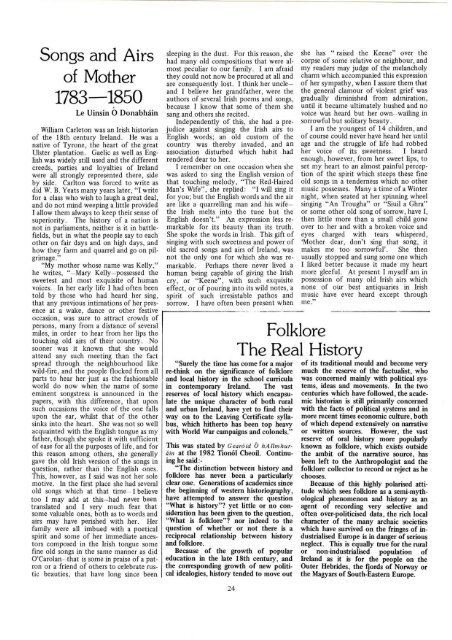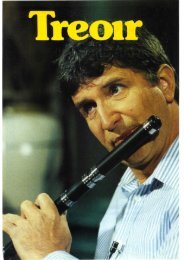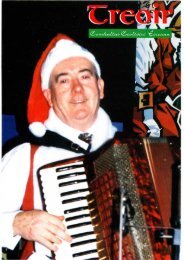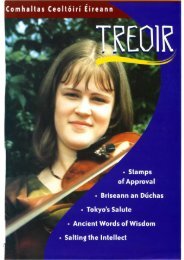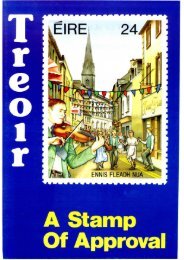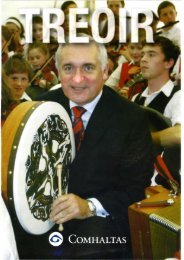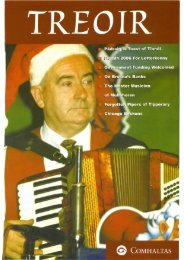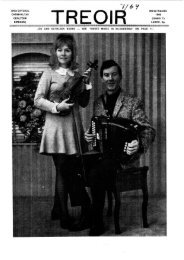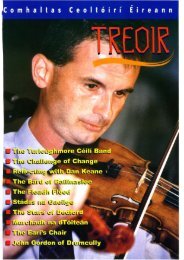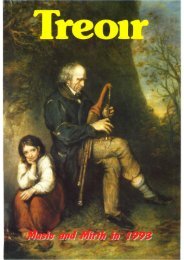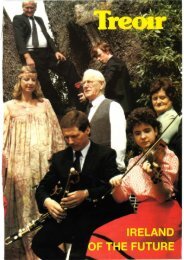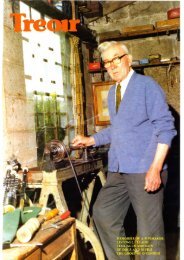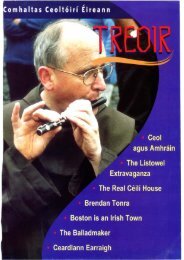Create successful ePaper yourself
Turn your PDF publications into a flip-book with our unique Google optimized e-Paper software.
Songs and Airsof Mother1783-1850Le Uinsin 0 DonabhainWilliam Carleton was an Irish historianof the 18th century Ireland . He was anative of Tyrone, the heart of the greatUlster plantation. Gaelic as well as Englishwas widely still used and the differentcreeds, parties and loyalties of Irelandwere all strongly represented there, sideby side. Carlton was forced to write asdid W. B. Yeats many years later, "I writefor a class who wish to laugh a great deal,and do not mind weeping a little pro'videdI allow them always to keep their sense ofsuperiority. The history of a nation isnot in parliaments, neither is it in battlefields,but in what the people say to eachother on fair days and on high days, andhow they farm and quarrel and go on pilgrimage.""My mother whose name was Kelly ,"he writes, "- Mary Kelly- possessed thesweetest and most exquisite of humanvoices. In her early life I had often beentold by those who had heard her sing,that any previous intimations of her presenceat a wake, dance or other festiveoccasion, was sure to attract crowds ofpersons, many from a distance of severalmiles, in order to hear from her lips thetouching old airs of their country. Nosooner was it known that she wouldattend any such meeting than the factspread through the neighbourhood likewild-fire, and the people flocked from allparts to hear her just as the fashionableworld do now when the name of someeminent songstress is announced in thepapers, with this difference , that uponsuch occasions the voice of the one fallsupon the ear, whilst that of the othersinks into the heart. She was not so wellacquainted with the English tongue as myfather, though she spoke it with sufficientof ease for all the Pl!rposes of life , and forthis reason among others, she generallygave the old Irish version of the songs inquestion, rather than the English ones.This, however, as I said was not her solemotive. In the first place she had severalold songs which at that time- I believetoo f may add at this- had never beentranslated and I very much fear thatsome valuable ones, both as to words andairs may have perished with her. Herfamily were all imbued with a poeticalspirit and some of her immediate ancestorscomposed in the Irish tongue somefine old songs in the same manner as didO'Carolan- that is some in praise of a patronor a friend of others to celebrate rusticbeauties, that have long since beensleeping in the dust. For this reason, shehad many old compositions that were almostpeculiar to our family . I am afraidthey could not now be procured at all andare consequently lost. I think her uncleandI believe her grandfather, were theauthors of several Irish poems and songs,because I know that some of them shesang and others she recited.Independently of this, she had a prejudiceagainst singing the Irish airs toEnglish words; an old custom of thecountry was thereby invaded , and anassociation disturbed which habit hadrendered dear to her.I remember on one occasion when shewas asked to sing the English version ofthat touching melody, "The Red-HairedMan's Wife" , she replied: "I will sing itfor you; but the English words and the airare like a quarrelling man and his wifetheIrish melts into the tune but theEnglish doesn't ." An expression less remarkablefor its beauty than its truth.She spoke the words in Irish. This gift ofsinging with such sweetness and power ofold sacred songs and airs of Ireland, wasnot the only one for which she was remarkable.Perhaps there never lived ahuman being capable of giving the Irishcry , or "Keene", with such exquisiteeffect, or of pouring into its wild notes, aspirit of such irresistable pathos andsorrow. I have often been present when"Surely the time has come for a majorre-think on the significance of folkloreand local history in the school curriculain contemporary Ireland. The vastreserves of local history which encapsulatethe unique character of both ruraland urban Ireland, have yet to find theirway on to the Leaving Certificate syllabus,which hitherto has been top heavywith World War campaigns and colonels."This was stated by Gearoid b hAllmhurdinat the 1982 Tionol Cheoil. Continuinghe said:-"The distinction between history andfolklore has never been a particularlyclear one. Generations of academics sincethe beginning of western historiography,have attempted to answer the question"What is history"? yet little or no considerationhas been given to the question,"What is folklore"? nor indeed to thequestion of whether or not there is areciprocal relationship between historyand folklore.Because of the growth of populareducation in the late 18th century, andthe corresponding growth of new politicalidealogies, history tended to move outshe has "raised the Keene" over thecorpse of some relative or neighbour, andmy readers may judge of the melancholycharm which accompanied this expressionof her sympathy, when I assure them thatthe general clamour of violent grief wasgradually diminished from admiration,until it became ultimately hushed and novoice was heard but her own- wailing insorrowful but solitary beauty.I am the youngest of 14 children, andof course could never have heard her untilage and the struggle of life had robbedher voice of its sweetness. I heardenough, however, from her sweet lips, toset my heart to an almost painful perceptionof the spirit which steeps these fmeold songs in a tenderness which no othermusic possesses. Many a time of a Winternight , when seated at her spinning wheelsinging "An Trougha" or "Siuil a Ghra"or some other old song of sorrow, have I,then little more than a small child goneover to her and with a broken voice andeyes charged with tears whispered,'Mother dear, don't sing that song, itmakes me too sorrowful'. She thenusually stopped and sung some one whichI liked better because it made my heartmore gleeful. At present I myself am inpossession of many old Irish airs whichnone of our best antiquaries in Irishmusic have ever heard except throughme ."FolkloreThe Real Historyof its traditional mould and become verymuch the reserve of the factualist, whowas concerned mainly with political systems,ideas and movements. In the twocenturies which have followed , the academichistorian is still primarily concernedwith the facts of political systems and inmore recent times economic culture, bothof which depend extensively on narrativeor written sources. However, the vastreserve of oral history more popularlyknown as folklore, which exists outsidethe ambit of the narrative source, hasbeen left to the Anthropologist and thefolklore collector to record or reject as hechooses.Because of this highly polarised attitudewhich sees folklore as a semi-mythologicalphenomenon and history as anagent of recording very selective andoften over-politicised data, the rich localcharacter of the many archaic societieswhich have survived on the fringes of industrialisedEurope is in danger of seriousneglect. This is equally true for the ruralor non-industrialised population ofIreland as it is for the people on theOuter Hebrides, the fjords of Norway orthe Magyars of South-Eastern Europe.24


